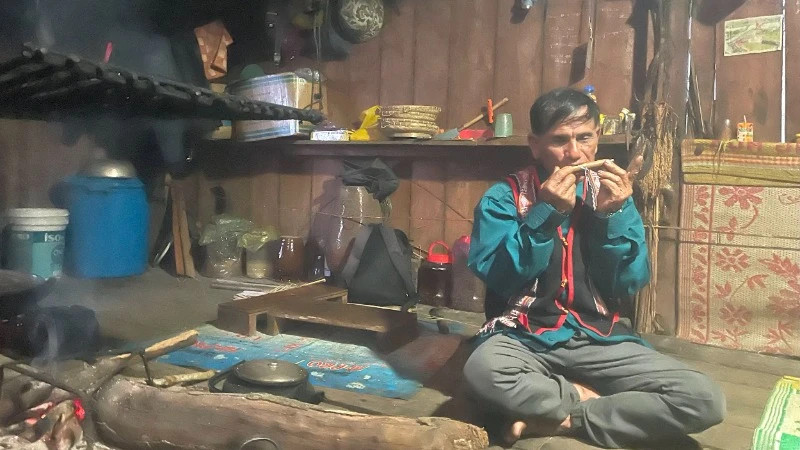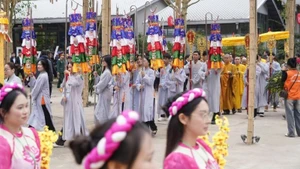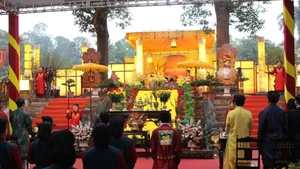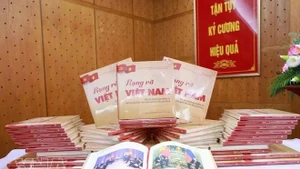In 2019, artisan A Le in Mang Canh Commune, Kon Plong District, Kon Tum Province received the title of “Meritorious Artisan” in folk performing arts. At that time, he received around 13 million VND (502 USD) as an honorary award. However, since then, he has not received any further rewards or support.
A Le’s income is modest, mainly from teaching gong playing or participating in cultural performances. As a member of the Xo Dang ethnic minority group (Mo Nam branch), he is highly skilled in gong techniques, flute playing (ta vau), and bamboo weaving. The resonant sound of his ta vau flute, combined with the rhythm of the gong, creates a unique charm in the Mo Nam community’s musical performances. Now over 70 years old, he remains dedicated to teaching the art of gong playing to the younger generation.
Similarly, village elder A Jring Deng, an ethnic Ba Na (Jo Long branch) from Kon Brap Ju Village (Tan Lap Commune, Kon Ray District, Kon Tum Province), was awarded the title of “Meritorious Artisan” in intangible heritage in 2018. Rich in gong-playing experience, he continues to teach under the communal house, never asking for payment or funding.
In Ako Dhong Village, Tan Lap Ward, Buon Ma Thuot City, Dak Lak Province, artisan Ama H’Loan, now nearly 90 years old, still diligently crafts traditional E De instruments such as ding buot, ding nam, and ding tak ta. As one of the last remaining traditional instrument makers in Dak Lak Province and a “Meritorious Artisan” honouree in 2019, Ama H’Loan also has deep knowledge of epic storytelling and gong tuning. However, his gong rhythms are no longer heard in the traditional cultural space but are now performed with the village’s art troupe to entertain tourists.
The modest fees from such performances do not reflect the value of Ama H’Loan’s contributions to preserving intangible cultural heritage.
In remote ethnic areas, cultural preservation faces many challenges, from human resources to funding. Government funding only covers part of the cost, and most cultural transmission is done within the community. Many localities can only organise short-term classes lasting about two weeks, offering learners only basic knowledge of intangible heritage.
In the long term, it is the artisans who continue to collect, preserve, and teach within their communities. Recognised or respected artisans wholeheartedly dedicate themselves to sharing their cultural knowledge. Despite limited or no financial incentives, they persist out of deep respect for their ancestral heritage and cultural passion.
Moreover, artisans are living encyclopedias of their people’s cultural history, bridging past and present, strengthening communal bonds. Many are respected village elders and community leaders.
According to Lai Duc Dai, Deputy Director of the Department of Culture, Sports and Tourism of Dak Lak Province, besides funding from national target programmes for socio-economic development in ethnic and mountainous areas (2021–2025 period) and the national cultural development programme (2025–2035 period), Dak Lak will soon receive additional resources to open classes for epic storytelling.
The instructors of these classes will be the artisans who preserve these cultural treasures. The province plans to implement a mechanism that provides wages for these artisans, supporting their livelihood and encouraging their ongoing dedication to cultural preservation.
Following the approval of the 2024 Law on Cultural Heritage at the end of last year, the Ministry of Culture, Sports and Tourism consulted in early January 2025 on the draft decree regulating policies for artisans and intangible heritage bearers. The draft proposes a monthly living allowance for People’s and Meritorious Artisans.
They would also be eligible for full health insurance coverage and support commensurate with current realities. This draft has drawn the attention of many artisans and cultural management agencies.
As the number of artisans and cultural bearers continues to decline, appropriate policies and support mechanisms are essential for honouring and recognising the vital role and talents of these core contributors to preserving and promoting ethnic cultural identity.
















